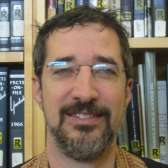
"The Political Reception of the Nazi Past and Postwar German Art"
Professional Background
Professor Paul Jaskot earned a Ph.D. and an M.A. in art history from Northwestern University, and a B.A. in history and English from Swarthmore College in Pennsylvania. During his fellowship at the Museum, he was an Associate Professor in the Department of Art and Art History at DePaul University in Chicago. For his Center for Advanced Holocaust Studies Fellowship, Professor Jaskot conducted research on, “The Political Reception of the Nazi Past and Postwar German Art.”
Professor Jaskot is the author of numerous scholarly articles and is the recipient of grants from DePaul University, Northwestern University, Beloit College, International Congress of the History of Art (Berlin, Germany), and Deutscher Akademischer Austauschdienst (Bonn, West Germany). In 2004 the United States Holocaust Memorial Museum’s Center for Advanced Holocaust Studies published his article “Cultural Policy and Political Oppression: Nazi Architecture and the Development of SS Forced Labor Concentration Camps” as an occasional paper. Further, Professor Jaskot’s book The Architecture of Oppression: The SS, Forced Labor and the Nazi Monumental Building Economy (London: Routledge, 2000) offers a blend of social, political, economical, and art/architectural history.
Fellowship Research
While in residence at the Center, Professor Jaskot researched the variable understanding and political function of the National Socialist past in relation to postwar art. He specifically examined the crucial changes in political history that are the necessary foreground in evaluating culture and, conversely, how significant analysis of cultural work is helpful in explaining the functional dynamics of politics. By studying buildings and artworks of intense public and ideological scrutiny, Professor Jaskot explored the possibilities or impossibilities of the ability of art to engage with historical change.
Professor Jaskot was in residence at the Mandel Center from November 1, 2006 to January 31, 2007.
